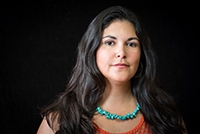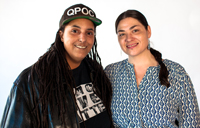Jessica Lopez Lyman's Response: Bodies Who Leisure in Midtown
I was born and raised in St. Paul’s Midway and have lived on and off in South Minneapolis neighborhoods (Longfellow, Corcoran and Powderhorn) for over ten years. As an artist, previous renter now landlord, previous student now full-time academic, I can trace my personal transformation alongside the neighborhoods I have lived. When I moved back from California after attending graduate school, I was shocked by the changes in the Midway and Frogtown neighborhoods. The light rail with its fancy mixed-usage housing and commercial spaces up and down University Avenue eroded my childhood memories. These were the blocks where I went trick-or-treating in the 1991 blizzard, walking with my family to my grandmother’s house. The snow, way above my knee, meant I was dragged most of the way by my father. These were the blocks where I first fell in love, learned to drive, and developed lifelong friendships. Across the river in South Minneapolis similar changes have occurred.
While the scholarship and community organizing around gentrification is extensive, I want to respond to two points in this study regarding culture. First, gentrification requires a change in naming practices by residents. The fear of “uptowning” is a legitimate concern as new, often middle class and white residents, move into the area. I would argue, however, that while we, as residents, fear uptowning, the real detriment to our community has already happened — the neighborhoods have been “Midtowned.” Walk up and down Lake Street, especially near the Midtown Global Market and you will see blue and yellow banners proudly hanging Midtown pride. Business owners along the corridor push for this branding as a way to unify a racially diverse area and simultaneously spotlight the avenue as a tourist destination for outsiders. Nancy Mirabal (2009) argues in her study on gentrification in San Francisco, the erasure of neighborhood names and the renaming of areas are vital to displacement.[1] With all the new names in Minneapolis — North Loop, South Loop, Near North – I become dizzy as I try to remember what was before. The five neighborhoods in this South Minneapolis study have unique, culturally specific histories. Gentrification requires new residents to believe nothing of value existed before, and requires long time residents to forget. There is resistance in remembering what was present before a $20 candle store came to the neighborhood or remembering the dreams that gave rise to Black-owned small businesses on 38th and Chicago Avenue.
Second, gentrification is fueled by the fantasy of play. Foundational to the creative economy is leisure. The creative class’ award for working hard, is playing hard. Entire cities transform to bring the freshest and hottest amenities to urban epicenters. In Minneapolis, new professional sports stadiums, transit overalls, greenways, bike lanes and walk-able corridors entice the creative class. Under a racist capitalist settler colonial system, however, not everybody is free to play. Part of our history as a nation-state is coming to terms with the reduction of Native bodies and bodies of Color (especially African and Black) to merely a means for labor production. Ritual, performance, and leisure were stripped from these communities. Fast forward to 2017. We witness the residue of this work continue to manifest in our police departments, neighborhood watch programs, and park systems. When interviewees in this study highlight the “white women running in the neighborhood” as a sign the neighborhood is changing, these residents are identifying a historical and racialized practice of disciplining certain bodies and allowing other bodies to move freely in public space. To challenge leisure politics, we need to play in public space and protect those who do not have the privilege to do so without being harmed. I am inspired by groups like Left Wing TC soccer who play in Powderhorn park, the Ecua-Volley players at Sabanthani, the Black bicyclist groups and Tamales y Bicicletas who slow roll around the neighborhoods, and the Native Water Protectors that shut down Cedar Avenue to play their drums. We don’t need greenways or bike lanes or micro-breweries. We need to support the businesses that “promise [to] not go nowhere,” and tell each other the stories of what existed before Midtown.

[1] Mirabal, Nancy. 2009. “Geographies of Displacement: Latina/os, Oral History, and the Politics of Gentrification in San Franscico’s Mission District.” The Public Historian. 31.2 p. 7-31.
